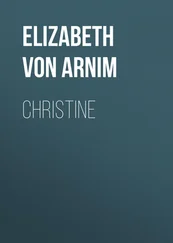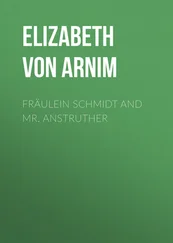Elizabeth von Arnim - The Pastor's Wife
Здесь есть возможность читать онлайн «Elizabeth von Arnim - The Pastor's Wife» — ознакомительный отрывок электронной книги совершенно бесплатно, а после прочтения отрывка купить полную версию. В некоторых случаях можно слушать аудио, скачать через торрент в формате fb2 и присутствует краткое содержание. Издательство: Иностранный паблик, Жанр: foreign_prose, foreign_antique, на английском языке. Описание произведения, (предисловие) а так же отзывы посетителей доступны на портале библиотеки ЛибКат.
- Название:The Pastor's Wife
- Автор:
- Издательство:Иностранный паблик
- Жанр:
- Год:неизвестен
- ISBN:нет данных
- Рейтинг книги:5 / 5. Голосов: 1
-
Избранное:Добавить в избранное
- Отзывы:
-
Ваша оценка:
- 100
- 1
- 2
- 3
- 4
- 5
The Pastor's Wife: краткое содержание, описание и аннотация
Предлагаем к чтению аннотацию, описание, краткое содержание или предисловие (зависит от того, что написал сам автор книги «The Pastor's Wife»). Если вы не нашли необходимую информацию о книге — напишите в комментариях, мы постараемся отыскать её.
The Pastor's Wife — читать онлайн ознакомительный отрывок
Ниже представлен текст книги, разбитый по страницам. Система сохранения места последней прочитанной страницы, позволяет с удобством читать онлайн бесплатно книгу «The Pastor's Wife», без необходимости каждый раз заново искать на чём Вы остановились. Поставьте закладку, и сможете в любой момент перейти на страницу, на которой закончили чтение.
Интервал:
Закладка:
It was out now, and she looked at him with miserable eyes, prepared for the worst.
"Doing what, Ingeborg?"
"I'm engaged, too."
"Engaged? My dear Ingeborg."
The Bishop was alarmed for her sanity. She really looked very strange. Had they been giving her too much gas?
His tone became careful and humouring. "How can you," he said quietly, "have become engaged in these few days?"
"Much may happen in a week," said Ingeborg. It jumped out. She did try not to say it. She was unnerved. And always when she was unnerved she said the first thing that came into her head, and always it was either unfortunate or devastating.
The Bishop became encased in ice. This was not hysteria, it was something immeasurably worse.
"Be so good as to explain," he said sharply, and waves of icy air seemed to issue from where he stood and heave through the room.
"I'm engaged to—to somebody called Dremmel," said Ingeborg.
"I do not know the name. Do you, Marion?"
"No, oh, no," breathed Mrs. Bullivant, her eyes shut.
"Robert Dremmel," said Ingeborg.
"Who are the Dremmels, Ingeborg?"
"There aren't any."
"There aren't any?"
"I—never heard of any," she said, twisting her fingers together. "We usedn't to talk about—about things like more Dremmels."
"What is this man?"
"A clergyman."
"Oh. Where is he living?"
"In East Prussia."
"In where, Ingeborg?"
"East Prussia. It—it's a place abroad."
"Thank you. I am aware of that. My education reaches as far as and includes East Prussia."
Mrs. Bullivant began to cry. Not loud, but tears that stole quietly down her face from beneath her closed eyelids. She did not do anything to them, but lay with her hands clasped on her breast and let them steal. What was the use of being a Christian if one were exposed to these scenes?
"Pray, why is he in East Prussia?" asked the Bishop.
"He belongs there."
Again the room seemed for an instant to hold its breath.
"Am I to understand that he is a German?"
"Please, father."
"A German pastor?"
"Yes, father."
"Not by any chance attached in some ecclesiastical capacity to the Kaiser?"
"No, father."
There was a pause.
"Your aunt—what did she say to this?"
"She didn't say anything. She wasn't there."
"I beg your pardon?"
"I haven't been at my aunt's."
"Judith, my dear, will you kindly leave the room?"
Judith got up and went. While she was crossing to the door and until she had shut it behind her there was silence.
"Now," said the Bishop, Judith being safely out of harm's way, "you will have the goodness to explain exactly what you have been doing."
"I think I wish to go to bed," murmured Mrs. Bullivant, without changing her attitude or opening her eyes. "Will some one please ring for Richards to come and take me to bed?"
But neither the Bishop nor Ingeborg heeded her.
"I didn't mean to do anything, father-" began Ingeborg. Then she broke off and said, "I—can explain better if I sit down—" and dropped into the chair nearest to her, for her knees felt very odd.
She saw her father now only through a mist. She was going to have to oppose him for the first time in her life, and her nature was one which acquiesced and did not oppose. In her wretchedness a doubt stole across her mind as to whether Herr Dremmel was worth this; was anything, in fact, worth fighting about? And with one's father. And against one's whole bringing-up. Was she going to be strong enough? Was it a thing one ought to be strong about? Would not true strength rather lie in a calm continuation of life at home? What, when one came to think of it, was East Prussia really to her, and those rye-fields and all that water? She wished she had had at least a piece of bread and butter. She thought perhaps bread and butter would have helped her not to doubt. She looked round vaguely so as not to have to meet her father's eye for a moment and her glance fell on the tea-table.
"I think," she said faintly, getting up again, "I'll have some tea."
To the Bishop this seemed outrageous.
He watched her in a condition of icy indignation such as he had not yet in his life experienced. His daughter. His daughter for whom he had done so much. The daughter he had trained for years, sparing no pains, to be a helpful, efficient, Christian woman. The daughter he had honoured with his trust, letting her share in the most private portions of his daily business. Not a letter had he received that she had not seen and been allowed to answer. Not a step in any direction had he taken without permitting her to make the necessary arrangements. Seldom, he supposed bitterly, had a child received so much of a father's confidence. His daughter. That crumpled and disreputable—yes, now he knew what was the matter with her appearance—disreputable-looking figure cynically pouring itself out tea while he, her father whom she had been deceiving, was left to wait for her explanations until such time as she should have sated her appetite. Positively she had succeeded, he said to himself, bitterly enraged that he should be forced to be bitterly enraged, in making him feel less like a bishop should feel than he had done since he was a boy.
"It's because I've had nothing to eat since Paris," Ingeborg explained apologetically, holding the teapot in both hands because one by itself shook too much, and feeling, too, that the moment was not exactly one for tea.
The Bishop started. "Since where?" he said.
"Paris," said Ingeborg; adding tremulously, having quite lost her nerve and only desiring to fill up the silence, "it—it's a place abroad."
Mrs. Bullivant murmured a more definitely earnest request that Richards might be rung for to take her to bed.
"Ingeborg," said the Bishop in a voice she did not know. "Paris?"
"Yes, father—last night."
"Ingeborg, come here."
He was pointing to a chair a yard or two from the hearthrug on which he stood, and his voice was very strange.
She put down the cup with a shaking hand and went to him. Her heart was in her mouth.
"What have you been doing?" he said.
"I told you, father. I'm engaged to Herr—"
"How did you get to Paris?"
"By train."
"Will you answer me? What were you doing in Paris?"
"Having dinner."
She was terrified. Her father was talking quite loud. She had never in her life seen him like this. She answered his questions quickly, her heart leaping as he rapped them out, but her answers seemed to make him still angrier. If only he would let her explain, hear her out; but he hurled questions at her, giving her no time at all.
"Father," she said hurriedly, seeing that after that last answer of hers he did for a moment say nothing, but stood looking at her very extraordinarily, "please let me tell you how it all happened. It won't take a minute—it won't really. And then, you see, you'll know . I didn't mean to do anything, I really didn't; but the dentist pulled my tooth out so quickly, that very first day, and so instead of coming home I went to Lucerne—"
"To—"
"Yes," she nodded, in a frenzy of haste to get it all said, "to Lucerne—I couldn't tell you why, but I did—I seemed pushed there, and after a little while I got engaged, and I didn't in the least mean to do that, either, really I didn't—but somehow—" Was there any use trying to tell him about the white and silver cake and the seven witnesses and the undoubting kind Herr Dremmel and all the endless small links in the chain? Would he ever, ever understand?—"somehow I did . You see," she added helplessly, looking up at him with eyes full of an appeal for comprehension, for mercy, "one thing leads to another." And as he still said nothing she added, even more helplessly, "Herr Dremmel sat opposite me in the train."
Читать дальшеИнтервал:
Закладка:
Похожие книги на «The Pastor's Wife»
Представляем Вашему вниманию похожие книги на «The Pastor's Wife» списком для выбора. Мы отобрали схожую по названию и смыслу литературу в надежде предоставить читателям больше вариантов отыскать новые, интересные, ещё непрочитанные произведения.
Обсуждение, отзывы о книге «The Pastor's Wife» и просто собственные мнения читателей. Оставьте ваши комментарии, напишите, что Вы думаете о произведении, его смысле или главных героях. Укажите что конкретно понравилось, а что нет, и почему Вы так считаете.












